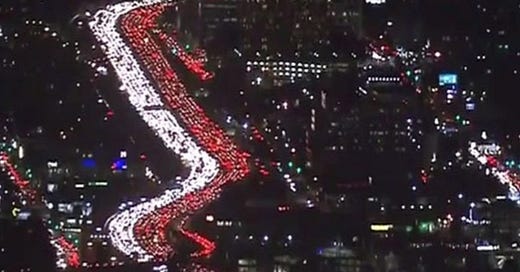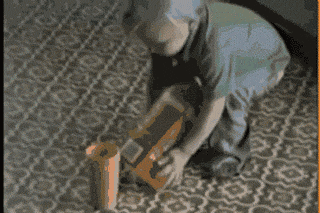Do you remember the moment you knew that 2020 was going south? Do you remember what made it real for you?
For me it was a Friday night, the one right before everything closed. We didn’t know what was going to happen, and foolishly, a few friends and I got together for one last time. I took the 405 from Venice to West Hollywood on a Friday evening, a trek that is usually ludicrous with traffic and to be avoided.
The 405
But on that night, the 405 was empty. My car and a few others hummed along in the dark, on a strip that is otherwise 10 lanes of headlights snaking slowly in both directions. My friends and I strolled into Spoon by H, a homey Korean restaurant that usually had long waits, but did not survive the pandemic. We ate, talked about the strangeness of it all, and hugged goodbye. I got home in 20 minutes, a trip that’s usually at least double that on a good day.
As I huddled at home with Animal Crossing and grocery delivery, I thought often of that empty highway. We’d come out of this different, I thought. Look how the air cleared, and how people slowed down, how they saw nature. Look how aware people are of the world around them. The recognition of the doctors and nurses, the appreciation of the essential workers who risked their lives to make the world go around. Surely we would remember the acute and fragile sense of interconnectedness.
I started writing this newsletter a year ago to capture and preserve this sense, some fidelity to the way we were once raw. Twenty-two posts later, and I can trace the emotional valleys from Covid and quarantine, through the summer of Black Lives Matter, through the horrorshow that was the election cycle, and into the early dawn of a possible post-Covid life. Whether we live with the virus or solve it for once and for all, the exuberance of today compared to a year ago is undeniable.
And yet, what have we really learned? The business world is getting swept away by the optimism of a post-vaccine world, and a newly elected progressive US government passes bill after bill before the inevitable pendulum swing backwards in two years. But we as individuals, and as a collective, can’t forget. Over at Why Is This Interesting, I wrote about how little we learned from the 1918 Spanish Flu, and started this newsletter partially as a way to not forget.
What are we forgetting already?
TLDR: In many cases, we’re choosing the individual over the collective. Generosity
I examined how crisis makes us more open to generosity, how the world paid attention to doctors and essential workers, and built a four part framework for how brands--and people--could be more generous.
Did we collectively learn anything?
Not really. The wealthy have saved boatloads of money over the quarantine, whereas the poor remain poor.
Amazon’s squashing any unionization efforts that could protect its essential workers. GoFundMe’s have become a way for people to source medical funds, relying on individual generosity rather than a societal commitment to health. Children are once again pouring over the border in search of a better life, but when I search for how to help, all the links are from the Trump era.
However, America did vote in Joe Biden, whose following in the footsteps of FDR in terms of seeing government investment as the way to a better America. Record amounts are being put towards supporting those who have the least among us.
Patience
I argued that the patience we’d learn from managing a pandemic could be extended to address other big problems that require collective action like climate change.
Did we collectively learn anything?
Welp. Patience is not humankind’s strong suit. In America, conspiracy theory overran measures like masking and distancing. With the specter of a post pandemic future, people are planning for mass parties and mega air travel, not ways to maintain a less environmentally-impactful lifestyle. The New York Times is calling it the YOLO economy, and the energy of immediacy rushes in to make up for a year spent indoors.
What are we continuing to work on?
TLDR: The cost has been high, but we're learning.Safety
I argue that feeling safe is a privilege that many Americans, especially Black people, do not have, and that America is recognizing the vulnerability of the Asian community as well.
Did we collectively learn anything?
We’re 147 mass shootings into 2021. Black people continue to be harassed and killed by police. Anti-Asian violence has also reached epic proportions, exploding the heads-down ethic typical of Asian immigrant communities. The storming of the White House showed us that even America’s most sacred institutions were not safe.
And yet, Derek Chauvin, the cop who murdered George Floyd, was convicted this week, changing the collective narrative of police impunity, and hopefully putting fear in the hearts of trigger happy cops. There’s talk of gun control legislation passing in the window of an all Democratic federal government. Safety isn’t around the next corner, but there’s a momentum to the awareness.
Race and Representation
I wrote about holidays, vice presidents, accountability, and a growing sense of what it means to be Asian American here and here.
Did we collectively learn anything?
Last year’s reckoning with Blackness and this year’s reckoning with Asianness were sparked by too much violence and loss. And yet, the conversations that were long overdue, the hiring spree for people of color, and the verdict against Chauvin are steps in the right direction.
Where have we made strides?
TLDR: We're working on it. Creativity
I wrote about how music, poetry, fashion, and advertising responded to the moment.
Did we collectively learn anything?
Creativity is constantly moving and changing, sensing the edges of culture and where we can go. For a long time much of the creative world felt stuck in a late-capitalist haze, where the intent of creative output was to make that cash. With the triple hit of the pandemic, the reckoning on race, and the election cycle in the US, creativity had something to respond to besides money.
Community
I wrote about what we could learn from small towns and life on Zoom.
Did we collectively learn anything?
Yes. Much of our work life has been restructured, and we’ve been forced to see people as they are—human, with children, and messes, and pets, and vaccine appointments. I cannot imagine us going back to the idea of a buttoned-up self, separated and unsupportive.
—
Personally and professionally, I’m still learning from this year. Next time, more about how I’m capturing and applying what I’ve learned.
If you appreciate this, please subscribe, share, and give it a ❤️.







